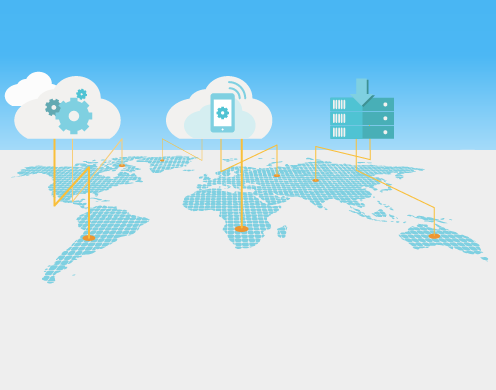Dynamics 365 for Operations: Cloud, Hybrid, and On-Premises Deployment Options
Dynamics 365 for Operations is currently available in the cloud, but in the next release, organizations will have the ability to deploy their Dynamics 365 for Operations instance utilizing additional deployment strategies – cloud and edge (hybrid), or local business data (on-premises).
With the local business data deployment, however, you have a disconnected data center, a local data residency, hardware investments, and a single instance only.
This blog will provide an overview of the three different Dynamics 365 for Operations deployment options that will be offered: cloud, cloud and edge, and local business data.
Cloud Deployment
The Dynamics 365 for Operations Cloud deployment option is a fully Microsoft-managed cloud service that includes:
- A system of cloud-enabled intelligent business applications
- Microsoft-managed data centers (DCs)
- Customer access to application lifecycle management (ALM) and telemetry via Microsoft Dynamics Lifecycle Services (LCS)
- Microsoft as your data trustee
- Tiered deployable development and sandbox environments, including high availability (HA) and disaster recovery (DR) capabilities
- A planned multi-instance federation
- Elastic scale-out
- Subscription-based licensing
Cloud ERP services are experiencing unprecedented adoption by mid-size and large organizations globally. Organizations are taking advantage of shorter implementation times as cloud ERP requires:
- Fewer customizations
- Repeatable industry or domain solutions
- Continuous updates

Cloud and Edge Deployment
The new Microsoft Dynamics 365 for Operations deployment option, cloud and edge, is a truly differentiated option that combines the power of both the Cloud and the on-premises, providing a hybrid cloud deployment that offers scalability, continuity, and intelligence.
This hybrid cloud deployment model scales out through federation of the on-premises nodes (My Workplaces), which are united within the Microsoft Cloud for a single, global enterprise view – which is a first for business applications. With cloud and edge, the cloud component will still be managed by Microsoft while the edge components will be managed by the customer.
An example of how this works is multiple local compute and storage workplaces for retail – such as shop floors and warehouses – can use cloud to scale. Master data management, data aggregation and local data residency, however, can all be managed under edge.

Cloud and Edge Highlights
- Deploying application servers on the edge:
- Some operations, like retail and manufacturing, may require a local application service for business continuity or integration with local systems.
- In some geographies, internet connectivity is poor and Azure Express Route, a service that enables you to create private connections between Azure datacenters and infrastructure, may not be available.
- Some geographies require that transactions and some business data be captured and stored locally, in addition to being stored in the cloud.
- Cloud and edge deployments give the best of both worlds:
- Business data is supported by local application services and data is stored locally.
- The central cloud model provides a single view of the business across distributed compute and application services in the edges.
- The power of the cloud is used for business intelligence.
My Workplaces
Dynamics 365 for Operations enables organizations to run their business processes from application servers at the edges. What this means is that transactions can be supported by local application services, as the organization’s business data is stored locally as well. Each such facility running at the edge is then referred to as “My Workplace”.
- Central Cloud Note– The central cloud node provides a single view of the business across distributed ”My Workplace” instances while utilizing the power of the Microsoft Cloud for embedded intelligence in business processes.
- Microsoft Cloud Connection– The Microsoft Cloud connection ensures data aggregation, financial reporting, intelligence, and more. The Cloud instance also provides the local installation with data failover in the Microsoft Cloud, automated deployment and continuous updates, and elastic compute capacity to infuse “intelligence” into the business process when needed.
Local Business Data (On-Premises) Deployment
The local business data deployment option enables you to run your business processes on-premises, supporting local transactions and storage of local business data without replicating your business data to the Microsoft Cloud.

In these cases, the typical replication of business data in the Microsoft Cloud (referenced in the cloud and edge scenario) is simply switched off. Cloud synchronization of data enables us to embed intelligence into business processes, such as embedded analytics, machine learning, and a vast range of capabilities that are best served from the Microsoft Cloud.
With this option, customers now have choice – an option to turn ON or turn OFF cloud synchronization of their business data. If customers turn OFF cloud synchronization, no business data leaves their trustee’s boundaries. Also, functions like embedded Power BI, aggregated views, and Azure Machine Learning services-based efficiencies are not available when cloud data synchronization is turned OFF.
Customers can choose to take advantage of the embedded intelligence functions by simply turning ON data synchronization to the cloud.
By summer 2017, Microsoft will support a single “My Workplace”, followed by federation of “My Workplace” instances in releases beyond. The cloud and edge and local business data deployments are planned for release in the summer of 2017.
Side-by-Side Comparison
The following table illustrates a side-by-side comparison of the planned scenarios, including use cases, components, strengths, and general availabilities:
For questions on which Dynamics 365 for Operations deployment option is best for your business, please contact Global iTS today.






